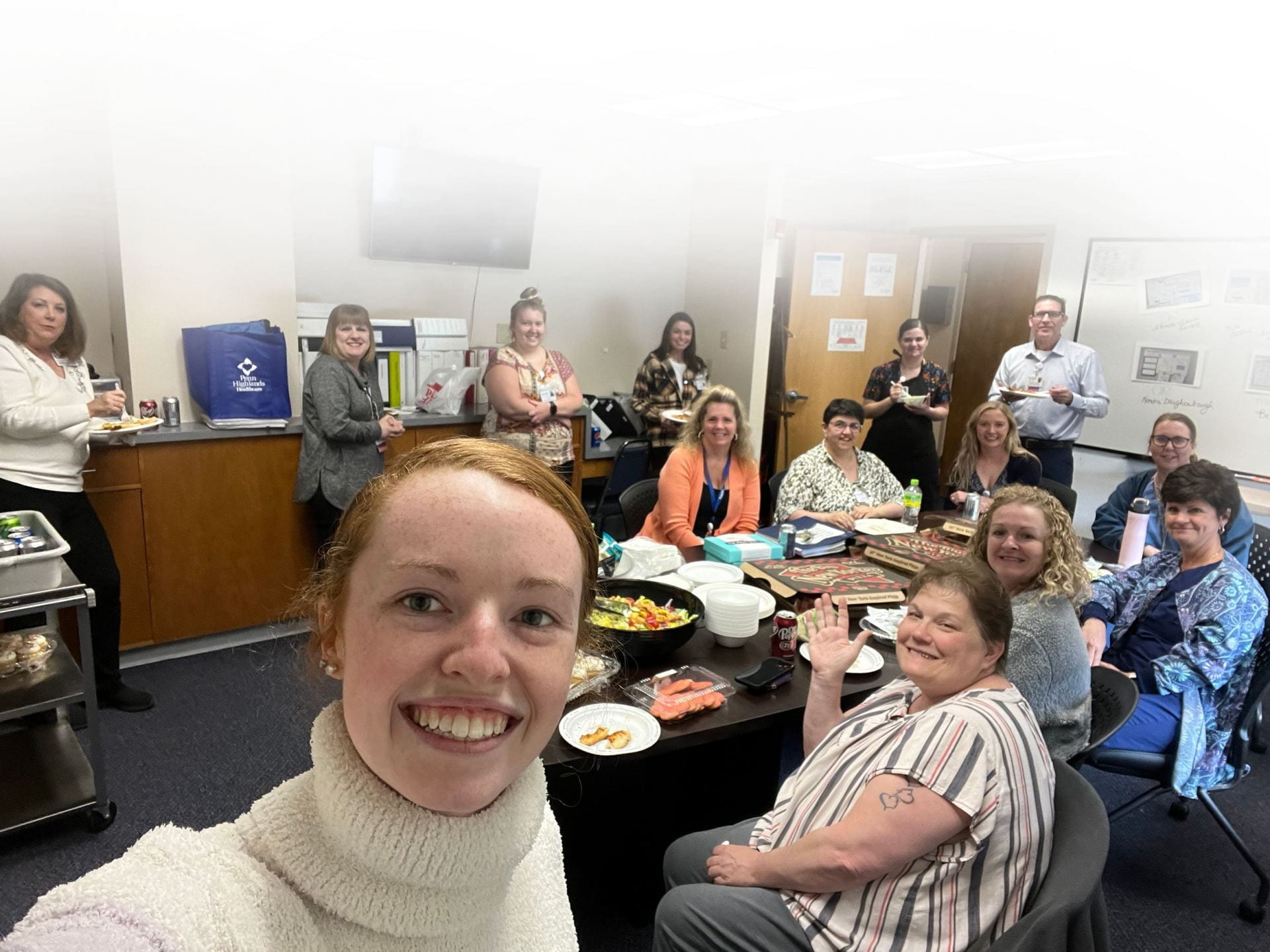Masters’ students and rural hospitals:
Real assistance and real-world education
Connecting students with opportunities
The Pennsylvania Office of Rural Health (PORH) places Penn State Master of Health Administration students in internships with hospitals and other health care providers across Pennsylvania. Students provide support and expertise to rural hospitals, and, in return, they receive a diverse set of real-world learning experiences that most master’s degree students never encounter.
Katelyn Evans completed her Master of Health Administration degree at Penn State in 2023. From Summer 2022 until she graduated, Evans collaborated with staff at Penn Highlands Tyrone, a rural Pennsylvania hospital, to improve efficiency and communication. In one of several projects, she gathered stakeholders from across the hospital to develop strategies for reducing wait times for patients in the hospital’s emergency department.
“The Master of Health Administration program was great. There was a tight cohort of students, and the professors were very supportive,” Evans said. “Most importantly, I learned so much in two years, and the work I did at Tyrone was the most valuable part of the program. I really feel prepared to enter the workforce.”
Reducing wait times in the emergency department
The emergency department is a critical unit in any hospital. Half of hospital admissions nationwide occur through the emergency department. Patients who enter the emergency department are often in distress and some are in life-threatening peril. Rapidly evaluating patients and providing appropriate care can make the difference between comfort or pain and even life or death.
Providing care in an emergency department is very complex, so the way in which patients move through the department involves a wide range of processes, procedures, and hospital units. The radiology unit often needs to provide x-rays or other scans, anesthesiology and surgery may be needed rapidly for some patients, and emergency department staff need to provide triage, first aid, prevention of disease or injury, observation, transfer to another facility to meet specific needs, and more.
When Evans began her internship at Penn Highlands Tyrone, she helped spearhead a program to analyze and improve the process flow for emergency department patients. Evans received a high level of support from the staff because quality process improvement was already an identified priority for the hospital.
Through a series of biweekly meetings, Evans collaborated with the chief nursing officer, the emergency department director, and representatives from units throughout the hospital: the laboratory, radiology, central registration, respiratory care, and various frontline workers. The team initially used sticky notes to document each step that emergency department patients experienced. Evans translated those sticky notes into process flows, and the team identified multiple free or inexpensive changes that saved time for patients and kept them safer.
“
Now, we get patients in more quickly and with reduced wait times. We also improved our triage system. [The project led by Evans] was a very valuable process.
— Murray Fetzer
Director of Human Resources
Penn Highlands Tyrone
”
“Katelyn’s fresh eyes were an asset in this process; she had not been doing this every day like those of us who work here full time,” said Murray Fetzer, director of human resources at Penn Highlands Tyrone. “Now, we get patients in more quickly and with reduced wait times. We also improved our triage system. It was a very valuable process.”
The hospital, the patients it serves, and the community benefited from the efficiency, and Evans gained first-hand experience considering the needs of a diverse set of hospital departments in a way that would be impossible at a bigger hospital.
Small-town experience creates big-time opportunities
“It was great to work on a project that touched so many departments, and it really made me feel connected to the work of the hospital,” Evans said. “My Gram grew up in Tyrone. Working there made me feel like I was helping my friends and my family, which meant a lot to me. I really am grateful to the Department of Health Policy Administration and the Pennsylvania Office of Rural Health for the education and opportunities that made this work possible.”
Evans worked on several other initiatives to support quality care at Penn Highlands Tyrone. In a separate project, Evans developed Performance Improvement Boards that were positioned throughout the hospital and updated monthly to let workers in every department quickly understand the department’s priorities and how well they were meeting important metrics.
“
— Katelyn Evans ‘MHA 23
”
Every intern has their own experience, but Evans’s work with Penn Highlands Tyrone is an example of the service and expertise that the PORH provides to rural hospitals across the state. Both Penn Highlands Tyrone and the PORH exist to support and improve the health of Pennsylvanians in small towns and rural areas.
“PORH’s entire focus is on serving rural Pennsylvania’s health care delivery system, residents, and advocates. A healthy rural Pennsylvania is our only priority. Our staff dedicates their knowledge, skills, and talents to ensuring that all residents of our state have access to high quality health care, regardless of geographic location,” said Lisa Davis, PORH director and outreach associate professor of health policy and administration. “I’m enormously proud of our staff, the work that we do, and our impact in the state and nationally.”
PORH is a collaboration between the federal government, the Commonwealth of Pennsylvania, and Penn State and is housed in The College of Health and Human Development’s Department of Health Policy Administration.

Aaron Wagner | Author
Photo Credits
Header image: by Knaupe via Getty Images
Story photos: courtesy of Katelyn Evans

